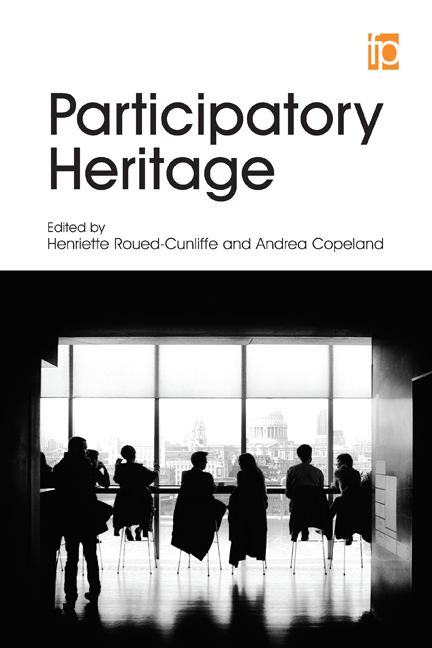Book contents
- Frontmatter
- Contents
- List of figures and tables
- Contributors
- Introduction: what is participatory heritage?
- Part 1 Participants
- Part 2 Challenges
- 8 Custodianship and online sharing in Australian community archives
- 9 Who is the expert in participatory culture?
- 10 Social inequalities in the shaping of cultural heritage infrastructure
- 11 No Gun Ri Digital Archive: challenges in archiving memory for a historically marginalized incident
- 12 Giving voice to the community: digitizing Jeffco oral histories
- 13 Issues with archiving community data
- Part 3 Solutions
- Further reading
- Index
10 - Social inequalities in the shaping of cultural heritage infrastructure
from Part 2 - Challenges
Published online by Cambridge University Press: 08 June 2018
- Frontmatter
- Contents
- List of figures and tables
- Contributors
- Introduction: what is participatory heritage?
- Part 1 Participants
- Part 2 Challenges
- 8 Custodianship and online sharing in Australian community archives
- 9 Who is the expert in participatory culture?
- 10 Social inequalities in the shaping of cultural heritage infrastructure
- 11 No Gun Ri Digital Archive: challenges in archiving memory for a historically marginalized incident
- 12 Giving voice to the community: digitizing Jeffco oral histories
- 13 Issues with archiving community data
- Part 3 Solutions
- Further reading
- Index
Summary
IN THIS CHAPTER I discuss the challenges that arise when well-funded institutions engage in the collaborative production of cultural heritage with marginalized communities. Ten years of university-led research on this topic in the United States shapes this discussion. Based on this experience, I articulate how social inequalities condition these partnerships. I also identify particular techniques that lessen the social inequalities that contextualize this type of work. This work is important because cultural heritage institutions around the world – including libraries, archives and museums – struggle to create and support socially just and inclusive representations of the past (Silverman, 2011).
Marginalized communities seek autonomy over their cultural heritage through diverse and evolving tactics. Recognizing and supporting these tactics requires (1) deep community engagement and (2) a commitment to supporting community leadership. Sensitivity to the diverse rhythms of community life leads to a more participatory heritage infrastructure across social divides.
This discussion is organized around three heritage projects. All three involved universities and marginalized communities. In the United States, community engagement projects emanating from universities are quite common (Driscoll, 2008). This tradition of university-led community engagement contextualizes these projects. In the first project, I worked with a small Black Arts museum in East St Louis to inventory and preserve the documentary holdings of the museum. Like other predominantly African- American communities in the United States, East St Louis has been severely affected by loss of jobs as a result of deindustrialization in the 1960s and 1970s. I found that the museum's board struggled to maintain its autonomy in relation to larger, external institutions, which in various ways also shape the museum. In the second project, I worked with diverse institutions and individuals in a local African-American community to create a digital library on local African-American heritage. I found that members of that community increasingly use social media as a semi-autonomous platform for cultural heritage production. The third project focused on helping a local librarian to create a digital library on African-American history in her community. I found that leaders of marginalized communities are ready and eager to direct cultural heritage projects. Recognizing and supporting community leaders takes time, but can also lessen social inequalities.
- Type
- Chapter
- Information
- Participatory Heritage , pp. 97 - 104Publisher: FacetPrint publication year: 2017
- 2
- Cited by



